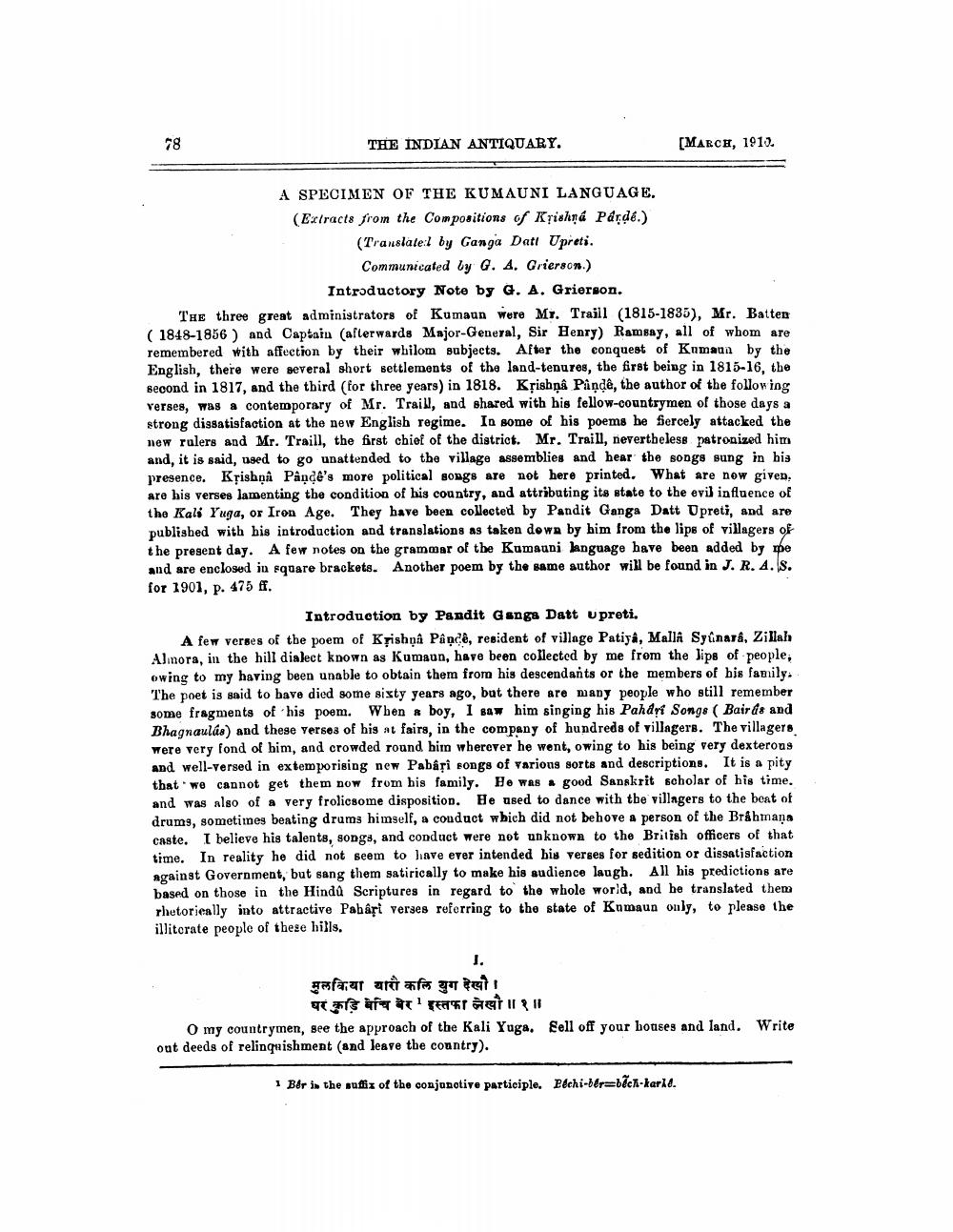________________
THE INDIAN ANTIQUARY.
[MARCH, 1910.
A SPECIMEN OF THE KUMAUNI LANGUAGE. (Extracts from the Compositions of Krishná Parde.)
(Translate:l by Ganga Dati Upreti.
Communicated by G. A. Grierson.)
Introductory Note by G. A. Grierson. The three great administrators of Kumaun were Mr. Traill (1815-1835), Mr. Batter ( 1848-1856 ) and Captain (afterwards Major-General, Sir Henry) Ramsay, all of whom are remembered with affection by their whilom subjects. After the conquest of Kumaga by the English, there were several short settlements of the land-tenures, the first being in 1815-16, the second in 1817, and the third (for three years) in 1818. Kpishņa Paņdê, the author of the following verses, was a contemporary of Mr. Traill, and shared with his fellow-countrymen of those days a strong dissatisfaction at the new English regime. In some of his poems be Sercely attacked the new rulers and Mr. Traill, the first chief of the district. Mr. Traill, nevertheless patronized him and, it is said, used to go unattended to the village assemblies and hear the songs sung in his presence. Křishội Pânce's more political songs are not here printed. What are now given. are his verses lamenting the condition of his country, and attributing its state to the evil influence of the Kali Yuga, or Iron Age. They have been collected by Pandit Ganga Datt Upreti, and are published with his introduction and translations as taken down by him from the lips of villagers of the present day. A few notes on the grammar of the Kumauni language have been added by me and are enclosed in square brackets. Another poem by the same author will be found in J. R. A.S. for 1901, p. 475 ff.
Introduction by Pandit Ganga Datt upreti. A few verses of the poem of Kyishņa Pande, resident of village Patiya, MallA Syanara, Zillah Aliora, in the hill dialect known as Kumaun, have been collected by me from the lips of people, owing to my having been unable to obtain them from his descendants or the members of his family. The poet is said to bave died some sixty years ago, but there are many people who still remember some fragments of his poem. When * boy, I saw him singing his Pahdyi Songs ( Bairds and Bhagnaulás) and these verses of his at fairs, in the company of hundreds of villagers. The villagers were very fond of him, and crowded round him wherever he went, owing to his being very dexterong and well-versed in extemporising new Pabâţi songs of various sorts and descriptions. It is a pity that we cannot get them dow from his family. He was a good Sanskrit scholar of his time. and was also of a very frolicsome disposition. He used to dance with the villagers to the best of drums, sometimes beating drums himself, a conduct which did not behove a person of the Brahmana caste. I believe his talente, songs, and conduct were not unknown to the British officers of that time. In reality he did not seem to have ever intended big verses for sedition or dissatisfaction against Government, but sang them satirically to make his audience laugh. All his predictions are based on those in the Hindu Scriptures in regard to the whole world, and he translated them rhetorically into attractive Pabari verses referring to the state of Kumaun only, to please the illiterate people of these hills.
मुलविया यारो कलि युग देखो।
घर कुड़ि बेचि बेर इस्तफा लेखौ ॥१॥ O my countrymen, see the approach of the Kali Yuga. Eell off your houses and land. Write out deeds of relinquishment and leave the country).
1 Bar in the suffix of the conjunctive participle. Pechi-b&r=bica-karls.




